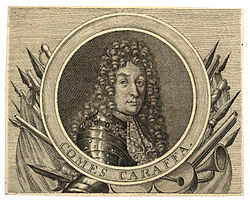Antonio Carafa (general)

Antonio von Caraffa(1646 – 6 March 1693) was a General Commissary (Generalkriegskommissär) of the Imperial-Habsburg Army—the highest rank in the Austrian military hierarchy at the time.[1]He also held various other high-ranking offices, including military governor ofUpper Hungaryand later royal commissioner ofTransylvania.
He was born in the NeapolitanHouse of Carafa.He was introduced at the Imperial Court (Kaiserhof) in Vienna in 1655 by his cousin CardinalCarlo Carafa della Spina.Later he entered the Imperial Army, and became a Colonel in 1672, when he participated in the War against the Turks in Hungary.
During theSiege of Vienna (1683),he was sent byLeopold I, Holy Roman Emperorto Warsaw, to urge Polish KingJohn III Sobieskito come to the help of the city. In 1685, he tookPrešovfrom the Turks.[2]
After the conquest ofUpper Hungary,he was appointed its military governor. He set up theExecutive Court of Prešov,by which he ruthlessly persecuted followers ofImre Thököly;the Court, whose proceedings remained secret, made widespread use of torture and executed seventeen supposed conspirators. For this event, Caraffa developed a reputation for cruelty among Hungarians.[3][4]The Hungarian nobility complained to the Emperor and Caraffa was given another position as General Commissary of the army.
He remained in Imperial service and conqueredPalanok CastleinMukachevo,defended byIlona Zrínyiafter a siege of three years. In this way, he was appointed royal commissioner ofTransylvania,and managed to persuadeMihály Telekiand an important part of the nobility to switch to the Austrian side. He also conqueredLipovaandLugoj.
His administration of Transylvania was also remembered as heavy-handed, for he extracted more taxes than the Ottomans had collected tribute.[3]
He played a very important role in theconquest of Belgradein 1688,[citation needed]and was for this rewarded with theOrder of the Golden Fleeceand lands inVoćin,Slavonia.
In 1691, he commanded the Austrian troops in theNine Years' Warin Italy.
His deeds were chronicled byGiambattista VicoinDe rebus gestis Antonj Caraphaei,first published in 1716 at the commission of Adriano Antonio Carafa (1696–1765).[1]
References
[edit]- ^abGiambattista Vico(2004). Giorgio A. Pinton (ed.).Statecraft: The Deeds of Antonio Carafa.Peter Lang. pp. 1–3.ISBN978-0-8204-6828-0.
- ^Kenneth Meyer Setton (1991).Venice, Austria, and the Turks in the Seventeenth Century.American Philosophical Society. pp.282–284.ISBN978-0-87169-192-7.
- ^abGiambattista Vico(2004). Giorgio A. Pinton (ed.).Statecraft: The Deeds of Antonio Carafa.Peter Lang. pp. 5–9.ISBN978-0-8204-6828-0.
- ^Charles W. Ingrao (2000).The Habsburg Monarchy, 1618-1815.Cambridge University Press. p. 85.ISBN978-0-521-78505-1.
Further reading
[edit]- (in German)ADB:Caraffa, Anton Graf von
- C. A. Schweigard:Österreichs Helden und Heerführer.Band 2. Grimma 1853, S. 366 ff.
- G. Benzoni (1976)Dizionario Biografico degli ItalianiXIX, pp. 485–94
